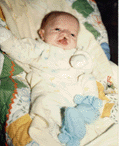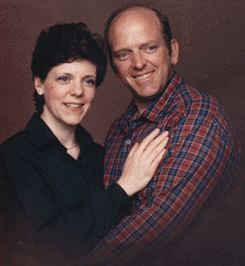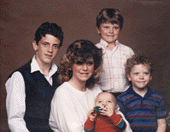
August 4, 1992
A year ago today, my son died. A year ago today, my six year old son, Colin died. A year ago today, a big part of my life, a part that I cannot retrieve, died. It just shouldn't be that way. I buried my 84-year-old-father a little over 3 years ago, and my mom died when I was 16, and even though both of those deaths caused me much sorrow, they were in the natural order of things. A child should bury his parents. But a parent bury his child! No! That's not the way it should be. I have a very strong faith, and thank God I do (as faith is crucial in my dealing with all of this), but someday I hope to have the chance to ask the Creator about why Colin died so young. I know He will have the perfect, loving answer, and I already have a few insights into what He might say, but I still must ask the question.
Colin was our fifth child, Claudia's and mine. I didn't "sit in" on the births of our first two children (Erin in 1970 and Robert in 1971) because, like many men, I thought the experience would be too gory, and in those days, men typically stayed out in the waiting room and paced or smoked or both. I did both. In 1977, Corrigan, Willis child #3, entered this world, and I was there. I had heard about the "miracle of birth," but those words were just a pious phrase for me until that day. It's almost impossible to put into words the pride, joy, ecstasy, awe, and humility that one can feel at that moment. Suffice it to say that I felt all of those things -- and many more. One humorous thing happened at Corrigan's birth. When he was only a few seconds old, the doctor placed him on his back on Claudia's stomach, and he proceeded to urinate into his own eye. I said, "welcome to the world, son," and the obstetrician and attending nurses were in hysterics. Just a few minutes before, he was warm and cozy in his protected environment, and then all those muscles were pushing on him, he came out into the cold world, lights were shining on him, people were touching him, and then this "stuff" was hitting his eye. You just have to like someone who begins life that way. He has lived up to being a character ever since. In 1979, our fourth child, Kenon, was born, and I was again present. He managed to control himself at the time.
But then the date was October 23, 1984. I was 40 years old, and Claudia was 36. That particular year (1984) had been by far the most difficult of my life. Besides my full time job as an English and Latin instructor at Granada High School in Livermore, California, I spent three hours per day after school teaching students to drive. Two nights per week, I taught a college-level English class at a nearby federal prison (FCI -- where Patty Hearst and Sara Jane Moore were incarcerated), and Claudia and I were in charge of the youth ministry (high school age) group for our local Catholic parish, St. Charles. About 100 youth showed up every Sunday night for our meetings, and besides putting together those meetings -- which had to be inspiring and entertaining to keep the kids coming -- we also had to arrange weekend retreats, seminars, social functions, outreach programs into the community, etc. We probably put about 20 hours per week into the youth group. Every Thursday night, for instance, I spent two hours in a room at the church, and young men and women could talk with me in confidence about anything. I was overwhelmed at some of the misery in the lives of those seemingly ordinary young people. Many laid their problems on my shoulders, as did some of my students at the federal prison.
As if all of this weren't enough, a local family was going through a divorce, and their 16 year old daughter stayed with us during the 1983-1984 school year. We were thus exposed to teenage problems a few years before we were quite ready for them. One other problem I was facing at the time was a high school student of mine who was making sexual advance toward me -- a problem I found very difficult to handle. And then Claudia became pregnant (unexpectedly) for the fifth time.
The upshot of all this was that on March 21, 1984, I had a severe anxiety attack, and it happened in front of my students at Granada. We were reading Arthur Miller's Death of a Salesman aloud in class, and I was reading the part of Willy Loman. All of a sudden, I felt as if I were standing on the edge of a steep cliff, reaching back, and holding on to a spiderweb-like string. That string was sanity, and if I let go of it, I was finished. All I could think of was that I was going insane and I was leaving Claudia with four children and pregnant with her fifth! That evening, she took me to the hospital, and, after much testing, the doctor prescribed valium (three pills). I was afraid to take those pills because if I recovered, I would be convinced that the pills had cured me and that I would "need" them any time a problem arose. To this day (more than eight years later) I still have those three pills. I rested for about four days, quit my job at the prison, and scaled down my time with the youth group. I was a volcano that erupted. We can only take so much pressure in our lives before we somehow explode. That was the most frightening experience of my life.
Also in 1984, I took out a sizable second mortgage on our home for investment purposes. Unfortunately, the real estate broker that I invested with went bankrupt a few months after I turned over the money to her. My $27,000 went directly down the drain. That was probably the most maddening experience of my life.
Are you catching a general drift about my year in 1984? I've often thought that I would write a book and entitle it Damn You, George Orwell, but he (and that year) are things I want to forget, not remember, and so I'd rather write about Colin, lest I forget.
I mentioned that I was a volcano. Well, maybe instead I was an earthquake, and as an earthquake fault has to let off pressure through little quakes occasionally to avoid "the big one," I had to have the anxiety attack so that I could deal with the much larger "tragedy" that was to hit our family in October of 1984. The night was October 23. Claudia and I were in the delivery room awaiting the birth of our fifth child. At Corrigan's and Kenon's births, the first words of the doctor were something like, "You have a healthy little boy!" This time the first words were, "We have a problem." Can you imagine what those four seemingly harmless words did to us? It was like driving spikes right through our hearts. At his birth, there was an immediate burst of activity by doctors and nurses, and some obvious anomalies. He had a cleft lip, a bilateral cleft palate, two abrasions on the top of his head where the skin did not close properly, an additional finger on each hand and an additional little toe on each foot, very tense muscle tone in his legs and arms, a hernia in the groin area, and a narrow artery between the right lung and the heart. With all these anomalies, the doctors immediately suspected a chromosomal abnormality, and so a geneticist from Oakland saw Colin late that morning. He took a blood sample so that white blood cells could be grown for a chromosome study. By that next Saturday, the test results were in.

Colin was diagnosed as having a rare syndrome called Trisomy 13. The prognosis for the syndrome was congenital heart problems, respiratory problems, severe to profound mental retardation and a much shortened life span. We were told that 60% of such babies die before they leave the hospital, 30% live up to a year, and about 10% survive to three years of age. Colin lived to almost seven, and so, as you can see, he was in the very top percentile. What a stud -- well, he was a Willis! Colin, thank God, did not have congenital heart problems, and all his major organs and digestive system worked well. While most such babies are around four pounds at birth, Colin was seven pounds. He also seemed stronger and more alert than most such babies -- a tribute to Claudia's care of him and of herself during pregnancy.
I would like to relate one incident from the night of his birth. When he was just a few hours old, a doctor asked me if Claudia had had amniocentesis done. If so, we would have known ahead of time about Colin's genetic "condition." The implication, I thought, was that if we had done that testing, we would have known a problem existed, and, of course, we could have "taken care of" that problem. I interrupted the doctor in mid-sentence and told him to end the discussion immediately before I became too irritated. I am a big man, and I was going through some intense emotions that night. I let him know that Colin was not a problem; he was our son. Most of the doctors we dealt with during Colin's life were wonderful; that particular one could have used some sensitivity training.


Colin spent his first week of life in the neonatal intensive care unit, and we learned to greatly appreciate the courage and caring of the nurses there. They did so much for us, and apparently we did something for them. We later learned that one nurse, who was married to a pediatrician, had been afraid to have children because she was daily working with children who were very sick or even dying. Apparently, when she saw how we all welcomed Colin into our family with so much love, she began to reconsider her opinion on having children. It's amazing the impact we can have on each other's lives!
From the beginning, we never asked "why," either of God or of the doctors. There was no good answer to that question, and it could only lead to bitterness and even blame. Instead we asked "what" -- what do we do to make Colin's life pleasant and meaningful, and what do we do to learn to deal with the adjustments he would bring into our lives? We lovingly welcomed him into his special place in our family and in the process became, I believe, stronger, more loving and more compassionate. I think that was the healthy way to deal with the situation.
In the first few weeks of his life, we had three very frightening experiences. The second and third were almost carbon copies of the first incident, which I'll now relate to you. One time Colin started to aspirate some amoxicillin that Claudia was giving him for an ear infection. She did all the right things -- used the bulb syringe to clear his throat and administered CPR, but he didn't respond quickly enough, and so she called 911. The firemen arrived and gave him oxygen; the ambulance then took him to the local hospital, where he was stabilized, and we then took him to Kaiser Hospital in Walnut Creek for a thorough "going-over." Claudia thought that first time that he was actually dead in her arms. That is an experience beyond description. By the way, that was just the first of many such trips.
Colin's lip and his palate were both surgically repaired in 1985, and the doctors tied off the two extra fingers. As there was no bone in the connective tissue, they soon afterward fell away. We chose to do nothing about the additional toes because they had bones in them and would have to be amputated. Why put him through any more than we had to? If we felt that he might have walked someday, then we would have done something about the toes. Over the years, he also had two hernia surgeries, a testicle surgery, and a series of ear implants. The poor little guy -- he went through such hell, and yet he was always so happy! An ophthalmologist also diagnosed a condition called Iris Coloboma, which meant that part of the iris was missing, and he also found a small cataract. Subsequently, Colin was fitted with "coke bottle" glasses, which he often ripped from his head and tossed as far as he could.
We have, many a time since Colin's arrival, thanked God for our faith, for the support of each other, and for the support from our church community and our friends. Speaking of which, when Colin first came home from the hospital after birth, we had three weeks of dinners brought in nightly to us by fellow parishioners. However, I wish the effort had been better coordinated -- in the 21 days, we had 16 lasagnas! In fact, one night (probably about the 15th of the 21), a person whom I barely knew was standing at our front door and holding a full-course meal for six. The meal included drinks and a dessert, all in throwaway containers so we wouldn't have to worry about washing and returning dishes. As I was profusely thanking this kind person, in the background, Corrigan, who was then seven, loudly said, "I hope it's not lasagna." It was! Imagine the embarrassment I felt and the lesson Corrigan then received in prudence.

Click on the butterfly to continue
Home | Page One |
Page Two | Page
Three | Page Four
people have visited this
page since 12-13-97.